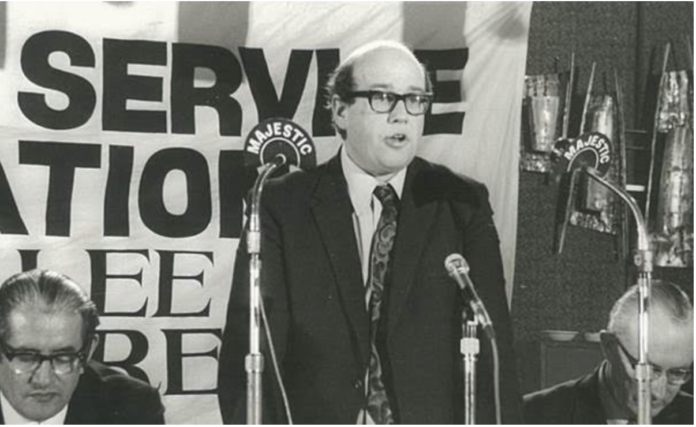STAN RODGER, Minister of Labour, and Minister of State Services in the Fourth Labour Government, died on Sunday, 29 May 2022, aged 82. Between 1978 and 1986, Stan was my Member of Parliament. In 1984, that crucial year which saw the fall of Robert Muldoon and his right-wing populist National Government, I found myself on Stan’s campaign team for the Dunedin North Labour Electorate Committee.
The Labour Party of 1984 was a monstrous creature. It’s branch membership, alone, was close to 100,000, with another quarter-of-a-million trade union members affiliated to the party. It also possessed a large and highly vocal left-wing: people who took the Party’s pledge to promote the cause of “democratic socialism” seriously.
One morning, early in 1984, three old comrades from the student protest movements of the 1970s chanced to run into one another in the student union cafeteria at the University of Otago. To our considerable consternation, we discovered that all three of us were working on the campaign committees of Labour MPs and candidates. Radical leftists who had laughed at the pretentions of Labour claimants to that title, now found themselves designing pamphlets, organising photo-shoots, and analysing canvassing returns. “Has it truly come to this?” We asked ourselves. “Have we all become fucking social-democrats!”
Within days of that embarrassing reunion, I had put a new set of words to the tune of Cliff Richard’s 1963 hit “We’re All Going On A Summer Holiday”.
We’re all working for a Labour victory
No more Trotsky, no more Lenin or Mao.
We’re all working for a Labour victory,
I’m glad the comrades cannot see us now!
Stan Rodger had a pretty good feel for the political leanings of the people he worked with. Certainly, he could recognise the many and various shades of red radicalism with relative ease. I was not the only “democratic socialist” on his campaign committee, although it is fair to say that we were easily outnumbered by the Labour moderates among whom Stan felt most comfortable. What distinguished him from practically every other member of the Labour caucus at that time, however, was his conviction that, to retain its political “soul”, the party needed to encompass the full range of democratic left-wing opinion. In the hierarchy of Labour’s “broad church”, that made Stan an Archbishop – at the very least!
Before his death, Stan Rodger allowed himself to be interviewed by the veteran political journalist, Richard Harman. In the course of that interview, Stan revealed something very few people outside the upper echelons of the trade union movement of the 1960s – and the Security Intelligence Service – knew anything about. Stan only learned the secret because he was a rising star in the Public Service Association (of which he would eventually become president) as well as being a senior bureaucrat in the Ministry of Works.
According to Harman, as Stan started moving up the ranks of the PSA he encountered a highly organised underground movement within the PSA intended to advance the ideology and clout of the far-left.
“Stan might have been a member of a political party that was still nominally socialist,” writes Harman on his Politik website of Tuesday, 31 May 2022, “but like most Labour Party members, he subscribed to Michael Joseph Savage’s argument that the party’s philosophy was actually ‘applied Christianity’. Stan, said Harman, “had no time for pure socialism or Marxism.”
But, Marxists there were in the public service: “a new cohort of university graduates with far-left views was making itself felt in Wellington.” According to Stan, the wartime Labour Government of Peter Fraser had placed many of these young firebrands in the Department of Industries and Commerce (DIC).
Now, as any good Kiwi leftist knows, the Department of Trade and Industry (as the DIC was renamed) came to be headed-up by New Zealand’s most effective left-wing intellectual, William (Bill) Sutch – the man who, in 1974, was charged with espionage on behalf of the Soviet Union – and acquitted.
Stan’s principal antagonist, however, wasn’t Sutch, but John P Lewin. Lewin, a former President of the PSA, senior official at Industries and Commerce and, ultimately, Government Statistician, was the man who, according to Stan, became the unofficial leader of a far-left group within the PSA, calling itself the Korero Group.
“It had many key activists in the PSA within it,” Stan told Harman, “with Lewin driving it out of the Trade and Industry department. And Jim Turner, the last member that I knew that was in it, told me it always ran with huge discipline and would even expel people out of the Korero. It essentially ran the PSA at arm’s length through the executive.”
What Stan Rodger has held back until he was safely beyond the reach of controversy are the bones of an explanation for one of the most devastating hit-jobs in the history of New Zealand political journalism. The exposé was published in the right-wing weekly newspaper, Truth, in July 1975, and it purported to expose a “plot” to socialise much of the New Zealand economy which had been hatched on behalf of Labour Prime Minister, Norman Kirk, by Labour MP, Gerald O’Brien, Bill Sutch and Jack Lewin.
Dismissed by Labour supporters at the time as just one more example of an increasingly sinister series of leaks and rumours (what we would, today, call “fake news”) intended to disorient and dismay the electorate in the run-up to the 1975 general election, Truth’s “Plot” may have been something else altogether.
If Stan Rodger knew about the Korero Group, so, almost certainly, did the SIS. Unable to prevent the likes of Sutch and Lewin rising high in the government department at the cutting edge of economic policy, the Security Services likely became increasingly fixated on the extent to which the “far-left” bureaucrats at Trade and Industry were influencing the direction of New Zealand economic development.
It is possible, therefore, that right through the 1960s, and into the 1970s, there was a race between the Left and the Right to find a group of politicians with the courage to undertake a drastic reform of the New Zealand economy. The persecution of Sutch, and the “fake news” about a plot to socialise the New Zealand economy (almost certainly leaked to Truth by the SIS) both bear testimony to the “Deep State’s” fear that the “hugely disciplined” left-wing “cell” in Trade and Industry had already found, or was about to find, the group it was looking for.
As the man who made certain that David Lange entered Parliament, Stan Rodger, set in motion the political sequence of events that culminated, ironically, in an equally disciplined group of ideologically-driven bureaucrats – this time concentrated in the Treasury – finding the group of politicians it had been looking for. The politicians who were to give us “Rogernomics”.
With Stan Rodger’s passing it is no longer possible to ask him if he saw the rise and rise of the neoliberal “cell” at Treasury as clearly as he saw the defusing and dispersal of the Trade and Industry Marxists and the Korero Group. I wonder if he would have agreed that there was a moment, at some point during those extraordinary post-war years, when New Zealand could have gone in an entirely different direction.






I recall a rough and ready Northern/National Distribution Union organiser in the 80s who used to crudely call Mr Roger–“Sideline Stan” or “Mudguard”–‘shiny on top and all shit underneath’.
Don’t speak excessive ill of the dead is usually best, but lets not forget that the Joint Council of Labour was dissolved under Stan’s watch. This was the body where the likes of the FOL’s leadership met face to face with senior NZ Labour Party figures and MPs. Significant matters were discussed, but of course neo liberalism seeks to deny class relationships–the individual is all. So this working class voice and influenced was terminated.
Would like to hear others comments on Chris contention before commenting further. Truth and the SIS (oh the analogue days)!
In his interview with Harman, Tiger, Stan was at pains to point out that the Joint Council of Labour had become dysfunctional – largely on account of Jim Knox’s mental deterioration. He also made no secret of his preference for (and seemingly good working relationship with) Ken Douglas.
Stan’s vision for the labour movement might best be summed up as “Bigger = Safer”. He genuinely believed, and clearly persuaded Ken Douglas to believe, that if New Zealand’s unions became larger, better resourced, fewer in number, and better led, then the abolition of compulsory membership (and compulsory arbitration?) would not harm them. He was, after all, a former PSA president – and the PSA was large, well-resourced and, most importantly, voluntary.
Stan simply lacked the imagination to foresee the sheer malevolence of the neoliberal hoodlums who, following Labour’s 1990 defeat, came gunning for the union movement. As for Ken Douglas, I am told that his refusal to “take on” Birch and Bolger was because he genuinely believed that Stan’s new, big unions, organised in the brutally centralised CTU, could survive the Employment Contracts Act.
How wrong both men were.
As we are learning from the debate over Fair Pay Agreements, if some measure of equity is to be achieved in the workplace, then the state absolutely must keep its thumb on the scales. Isolated individuals, working in a viciously anti-union ideological environment, are no match for the boss: regardless of whether that boss is acting alone, or with the backing of the bosses’ “union” – Business NZ.
The State must guarantee and facilitate the workers’ right to organise, because that’s the only way they can win. It’s why the Labour Party was formed – to make sure the workers had the state at their back. A Labour minister who makes a virtue out of standing on the sidelines – as Stan did – betrays the labour movement every bit a grievously as the neoliberal union-busters of the Right.
Good comment Chris. Will track down the full Harman piece.
I am harsher on KGD than you of course–I think he knew exactly what he was doing in ideologically abandoning his SUP coterie–without the courtesy of informing them first! But that does not deny a dialectic between Stan Rodger and Ken that formed some of his views. There were some disastrous union amalgamations from the “Big” model too–Dairy Workers and Textile and a lot of “Lifeboat” amalgamations as the late Bill Andersen termed them, enacted for mere survival.
The NZCTU’s beloved Tripartism was based on the erroneous view that your sworn class enemies could become your friends. A simple look at Reagan and Thatcher, and Pinochet’s First Minister of Labour José Piñera, a Chicago Boy, who in part inspired the 1991 ECA, should have disabused them of that.
No, Douglas remains a class collaborationist and right opportunist.
Sutch and secret PSA cells look patriotic as time unfolds because they sought to represent and benefit the masses rather than the elites.
At this point, I didn’t recognise his name here initially but it’s all coming back to me now. The happy smiling unionist through the transfer of our country to the rich’s tender mercies. On the account of his past I was especially venomous about him.
It was all on show and all the famous MPs were bought and sold. Excepting Anderton we learnt about Left opposition in memoirs. A lesson in the importance of power in quieting truth. Bill Rowling as happy as larry in Washington.
LoL! I knew he was called SidelineStan, but I never heard mudguard. As this reads he was instrumental to Rogernomics.
Very interesting article Chris……Stan grew up in my neighbourhood and was in my oldest sisters class at primary school. This group you write about that wanted to nationalise a large part of New Zealand’s industry will , I suppose , be the people that were going to get their hands on the superannuation money from the new scheme set up by Norman Kirk and was perhaps the reason Muldoon scrapped it and set up the pay as you go scheme we have today.I remember my dad telling me exactly that same story when I was a new apprentice….Why are the governments fiddling with the pension scheme dad? I asked….There’s a group that want to get their hands on that money and buy up all the businesses , he said…well..bugger me…we now have names…..I wonder how much New Zealand would have had in the bank if Kirks scheme had of still been with us today….It would of had to be one of Muldoons biggest cock ups getting rid of it…..Thanks again Chris for the interesting article and my condolences to Sids family and friends….
Sorry…Stan’s family….
NPF. CPF, have a look at Singapore, there is nothing there that the state does not have a finger in the pie. Bryan Gaynor RiP, said disbanding it was the single biggest financial this country has ever made.
NPF. CPF, have a look at Singapore, there is nothing there that the state does not have a finger in the pie. Bryan Gaynor RiP, said disbanding it was the single biggest financial mistake this country has ever made.
The scheme wouldnt have survived the carve up of the state sector in the 1980’s. It probably would have ended up being privatised and sold off.
As it is, Kirk’s scheme left out a lot of people, ie disabled, sick, women (esp. housewives), and those who drifted in and out of job.
Wouldn’t it have, though? As long as we have a political system that allows satanic neoliberal wreckers to come to power, the preservation of any sort of social welfare will be best preserved by following the most pro-human, left-wing policies of nationalization possible. Better systems take longer to wreck.
Well a young Roger Douglas, was the one who set up the Kirk/Rolling Super Scheme. Had Rolling won in 75 it would be highly unlikely those SOE assets would’ve been flogged off & more likely they would’ve gone into a Singapore/ Norway Sovereign Wealth management type Corporation.
It’s probably one of the great NZ Political “What if’s” that could’ve changed the history of NZ for the better.
Just like Bill Sutch’s plan/ book for NZ’s Quest for self-sufficiency, which is another great what if as well.
I wonder what happened to my 37 weeks of contributing to the Labour scheme….Did I get it back..not sure…maybe someone can remember who was in the know back then…..
everyone got their super money they had paid in on their next tax return from memory.
i was one of the folks that got it paid back.
Yes – I was there and we were all fully refunded.
(As an aside, it is not ‘would of’ – it is either “would’ve” or “would have”.
You have mistaken “would’ve” for ‘would of’.
“Would’ve” sounds like “would of” but is actually short for “would have”.
Grammatically, ‘would of’ cannot possibly exist. I saw you using ‘would of’ on a different comment, not the one on this thread.
Just trying to maintain my status as worst pedant on the site..
Many thanks Vino….My grammar is not the best, I know that , and I apologise profusely…But I’ve changed it to “ would of “…..you can do things like that now apparently… you can change the name of your country if you feel like it also…No doubt I will write things wrong in the future , but I do try to draw the line at cuss words….some jolly beggars on this site need their mouths washed out with soap…
What an obituary.
I remember the silence, except for the Rogernomic ‘Left’, when I criticised Mike Moore being described in the papers as a working class hero. Still makes me wrinkle up in disgust.
Why, how could he be silent for 30 years?! Did he have a brain aneurism in 90? I hate these people who sold us down the river and whose only response since is to try and place their children in modern still rogernomic Labour.
No ideals involved, all about power and position.
My Grandmother, Labour Party activist from the early 1920s to retirement in the 60s, PSA activist in the Public Service Equal Pay Campaign through the 1940s & 50s … was a member of Lewin’s Korero grouping & quite friendly with Sutch … not sure the Korero was quite as radical as Stan would have us believe however. Don’t think my Grandmother, for instance, ever saw herself as a Marxist … more a Left Social Democrat. Very much a Labour Party loyalist (& great admirer of Nordic Social Democracy as opposed to, say, Mao’s China or the Soviet Union) … not part of some sort of far left Militant Tendency-style infiltration that Stan appears to be hinting at.
She was certainly progressive in terms of mid-20C feminism & views toward Māori (as was the entire Korero grouping) … but above all a believer in the common-sense & talents of ‘ordinary’ people … wouldn’t have been too taken with the professional middle class Woke capture of Left organisations, their self-interested elitism & authoritarianism (posing as moral refinement) or their highly-selective top-down empathy resulting in the vicious scapegoating of swathes of the lower income along ethnic lines. The days when Left activists lived in the real world.